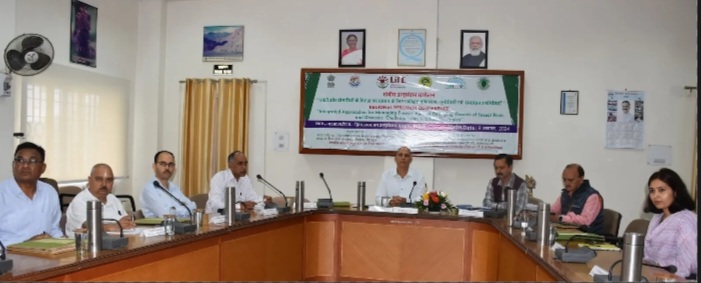Regional Conference on Forest Management Held in Shimla: Experts Discuss Growing Pest Problems Due to Climate Change.
Shimla: August 9, 2024: To address the outbreak of pests in farms and forests, the forest scientists caution here that use of more and more pesticides of solutions 1- 1.5 percent rather than the recommended 0.5 percent is worsening pest menace which is triggered by climate change in the country.
These observations came up at the conference organized at Himalayan Forest Research Institute (HFRI) in Shimla, in collaboration with the Forest Research Institute (FRI), Dehradun.
The daylong regional research conference was titled "Integrated Approaches to Forest Management Against Pests and Diseases: Challenges and Strategic Solutions."
The conference, held in a hybrid mode, focused on critical issues related to forest management and the growing threat of pests due to climate change.
Dr. Sandeep Sharma, Director of HFRI Shimla, inaugurated the event and highlighted the increasing challenges posed by pests as a result of climate change, stressing the need for further research to control this growing threat. He expressed hope that the recommendations emerging from the conference would significantly contribute to the development of new projects.
The event's chief guest, Mr. Jagdish Chandra, Principal Chief Conservator of Forests and Managing Director of the Haryana Forest Development Corporation, discussed the challenges and strategic solutions for managing the emerging threats of pests and diseases in the northern states and Union Territories.
He emphasized the importance of adopting integrated pest management (IPM) strategies and prioritizing biological management methods to protect the environment and ecology.
Dr. Rajesh Sharma, Deputy Director General of Research at FRI Dehradun, emphasized the need for joint research projects among institutions, aligned with the guidelines of the Ministry of Environment, Forest, and Climate Change.
He also stressed the importance of considering national and international commitments related to climate change when designing research projects.
Dr. Pawan Rana discussed insect biodiversity, noting that insects and butterflies serve as indicators of climate change.
He mentioned the ongoing habitat changes in the Monarch butterfly due to environmental shifts and emphasized the need for awareness among stakeholders regarding the appropriate use of pesticides.
He pointed out that excessive pesticide use, such as applying 1-2% solutions instead of the recommended 0.5%, is harmful to the environment.
The conference provided valuable insights and recommendations that could play a crucial role in the future development of forest management strategies and research initiatives.








